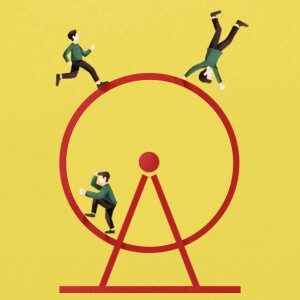
Monday Aug 21, 2023
The Power of Habit: Why We Do What We Do in Life and Business
Chapter 1:The Meaning of The Power of Habit
"The Power of Habit" by Charles Duhigg explores the underlying mechanisms and significance of habits in our lives. The book delves into why we develop habits, how they are formed, and most importantly, how we can harness the power of habit to transform our behavior and achieve personal and professional success.
Duhigg investigates the science behind habit formation, drawing upon research from various fields such as psychology, neuroscience, and sociology. He explains the habit loop, which consists of a cue, routine, and reward, and reveals how understanding this loop can help us identify and modify our habits.
The book emphasizes that habits play a crucial role in shaping our daily actions, influencing everything from individual behavior to organizational cultures. By recognizing the patterns and triggers that drive our habits, we can gain control over them and make intentional changes.
"The Power of Habit" also explores the impact of habits on society, examining how organizations, advertising, and social movements use the science of habits to shape behaviors on a larger scale. It highlights the potential for individuals and groups to leverage this knowledge to create positive change in their lives and communities.
Overall, "The Power of Habit" provides insights into the intricate nature of habits and their influence on our lives. Through real-life examples and engaging storytelling, the book offers practical strategies and techniques for breaking bad habits, establishing new ones, and ultimately transforming ourselves for the better.
Chapter 2:How Does The Power of Habit End
"The Power of Habit" by Charles Duhigg concludes by emphasizing the potential for personal transformation through the understanding and manipulation of habits. Here is a brief summary of how the book ends:
-
The Power of Awareness: Duhigg emphasizes the importance of self-awareness in recognizing our habits and understanding the cues, routines, and rewards that drive them. By becoming more conscious of our behavior patterns, we can gain control over our habits and make intentional changes.
-
Keystone Habits and Ripple Effects: The book discusses the concept of keystone habits, which are small changes or habits that have the power to create a domino effect of positive transformations in various areas of our lives. By focusing on changing key habits, we can experience far-reaching impacts on our overall well-being and success.
-
Transforming Organizations: Duhigg explores how habits can shape organizational cultures and explains how leaders can use this knowledge to create positive change within their teams and companies. He provides examples of successful businesses that have embraced habit-based strategies to enhance productivity, innovation, and employee engagement.
-
Social Movements and Habit Change: The book also highlights the role of habits in driving social movements and societal shifts. Duhigg shares stories of individuals and communities who have harnessed the power of habits to bring about significant social and political change, showing that habits can influence collective behaviors on a larger scale.
In the final chapters, Duhigg encourages readers to apply the principles and insights from the book to their own lives. He challenges readers to identify their habits, experiment with habit changes, and embrace the potential for personal growth and transformation that comes with understanding the power of habit.
Chapter 3:Quotes for The Power of Habit
-
"Change might not be fast and it isn't always easy. But with time and effort, almost any habit can be reshaped."
-
"Habits, scientists say, emerge because the brain is constantly looking for ways to save effort."
-
"This is the real power of habit: the insight that your habits are what you choose them to be."
-
"Once you understand that habits can change, you have the freedom and the responsibility to remake them."
-
"Champions don’t do extraordinary things. They do ordinary things, but they do them without thinking, too fast for the other team to react. They follow the habits they’ve learned."
-
"The Golden Rule of Habit Change: You can't extinguish a bad habit, you can only change it."
-
"Small wins are a steady application of a small advantage."
-
"Willpower isn't just a skill. It's a muscle, like the muscles in your arms or legs, and it gets tired as it works harder, so there's less power left over for other things."
-
"The key to exercising regularly, losing
No comments yet. Be the first to say something!